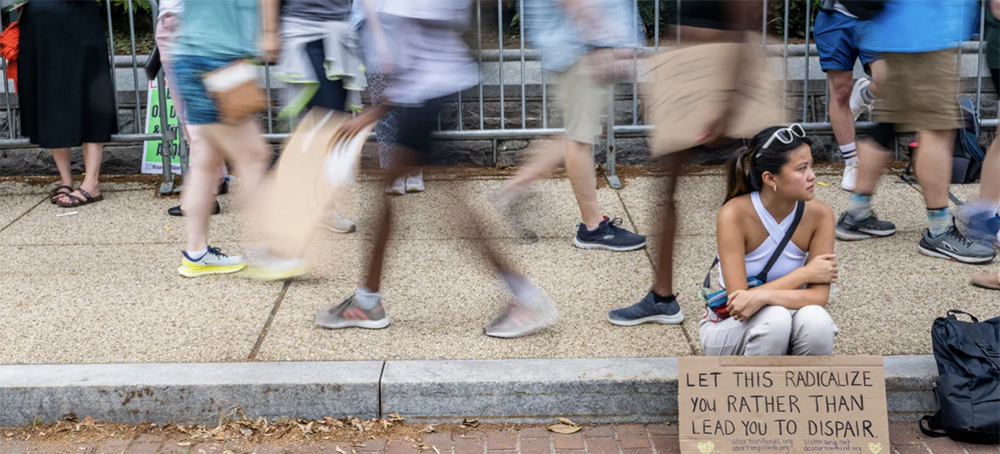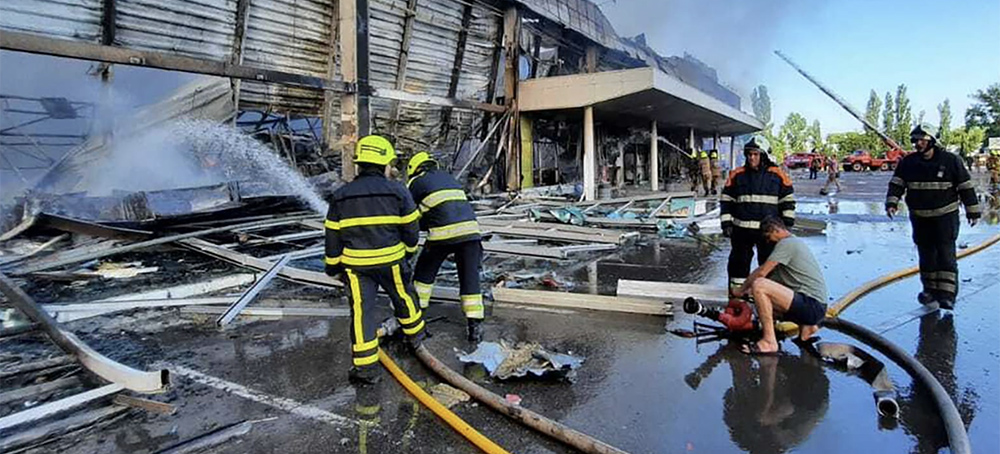Live on the homepage now!
Reader Supported News
Last week was exceptionally successful for Ukraine. I consider dates 15, 16, 17 to be turning points in the Russian-Ukrainian war. But what should we expect next?
And this will continue consistently thanks to a very important initiative of UK Prime Minister Boris Johnson. After all, it’s not just weapons that are important, but also people who have mastered to use them. Johnson stated that the UK will take care of the training of 10,000 Ukrainian soldiers (apparently new recruits) at British bases over three months.
This comes just in time, as the Ukrainian army needs to be replenished, with not just cooks and academics who volunteered to fight, but with professional soldiers. And the UK will train them for us.
And the most important thing was the failure of the mission of Macron, who was hiding behind the Italian prime minister (of the Italian peace plan). Both tried to persuade Ukraine to make major territorial concessions for the sake of the so-called peace. But after June 16, no one will force Ukraine to do this. Moreover, the following days showed that this unified stance had finally been adopted by the West. This is not now just the stance of Washington and London, but of Berlin, and Paris as well (Macron and Scholz have been forced to join).
A vital condition has been declared. And Ukraine agrees with this approach. Moreover, as Ukrainian President Volodymyr Zelensky himself had previously stated, there will be no negotiations until the Russian army retreats to their positions as on Feb. 23. This is the condition Russia needs to meet if they want anyone to negotiate with them. Otherwise the West will make every effort to supply and train the Ukrainian army so that it can push Russia to those positions by force.
But this doesn’t mean that Ukraine is abandoning the occupied territories of Luhansk and Donetsk oblasts, or Crimea. This is a condition that is required in order to begin the negotiations on the return of Donbas and Crimea to Ukraine, and the full restoration of Ukraine’s territorial integrity. Now this is the unified position of the West and Ukraine.
And this is a very serious blow to Russian plans, as they had high expectations for this very mission of Macron. Russia hoped that the same thing would happen as with Georgia and with Crimea in 2014 – a French president would show up and provide a peace treaty that gives Russia more territory. Now, it’s completely impossible, as giving away Zaporizhzhya and Kherson Oblasts to the Kremlin means taking further steps towards the destruction of the entire Ukrainian statehood. And now the Kremlin will never receive this from the West.
Many people are guessing now about when the collapse of the Russian Federation will finally begin. We are striving for the complete territorial integrity of Ukraine, and what happens in the Russian Federation is their internal affair.
But it is quite obvious that when this offensive operation begins (in about two months, when the Armed Forces of Ukraine will be fully armed with modern weapons), the first step will be the liberation of Kherson. And I assure you, that the liberation of Kherson alone will cause shock among the Russian public, who are neck-deep in Russian TV propaganda. The same goes for Putin's bunker. It will ignite a lot of very turbulent political processes in Russia.
This condition – the withdrawal of Russian troops to the positions as of Feb. 23 is the goal the West won’t divert from until it is achieved. For Putin, it’s a catastrophe. This condition is incompatible with his political life. I think it’s incompatible with his physical life as well.
So the processes that begin the collapse of the Putin regime and the further transformation of the Russian Federation will occur automatically when Ukraine wins with the new weapons. You don't even need to take extra steps to take care of Russia beyond that.
 Rachel Nix, 24, sits on a curb while processing the Supreme Court's decision in Washington, D.C. (photo: Brandon Bell/Getty Images)
Rachel Nix, 24, sits on a curb while processing the Supreme Court's decision in Washington, D.C. (photo: Brandon Bell/Getty Images)
But Dobbs v. Jackson Women’s Health Organization is also the beginning of a new one: politically, legislatively, and legally. In fact, there are still ways to defend women’s rights in court, including some already underway. “There are opportunities to reduce the harm,” Brigitte Amiri, deputy director of the ACLU’s Reproductive Freedom Project, said in an interview hours after the Court’s decision. “And that’s the point where we are now.”
Avenues exist on both the state and federal levels.
Several states have guarantees of privacy, autonomy, and bodily integrity in their constitutions that are absent in the federal constitution. In Florida, for example, the ACLU and Planned Parenthood have already sued to stop a 15-week abortion ban on the basis of the state’s constitution, which contains a right to privacy. (Since the law is set to go into effect on July 1, the hearing on the ACLU’s motion for a preliminary injunction is this Monday.) In Utah, they filed suit on Saturday on the basis of several parts of that state’s constitution covering family rights and the right to privacy. Meanwhile, in Michigan, the ACLU won an injunction last month to stop the state’s 90-year-old abortion ban from going into effect once Roe v. Wade was overturned. A court there found that the ban violates the rights to liberty, bodily integrity, and privacy under Michigan’s constitution and civil-rights laws. Similar cases are pending in Ohio and North Carolina. “We have years of experience suing under state constitutions when there were laws that we couldn’t challenge federally,” said Amiri, citing the exclusion of abortion coverage from Medicaid as one example.
State laws can also be used to defend abortion rights where Religious Freedom Restoration Acts, or RFRAs, are in force. Under the RFRA, any time a law substantially burdens religious practice, the government must show that law is narrowly tailored to further a compelling state interest. Using that standard, state and federal courts have carved out numerous religious exemptions to laws to which conservative Christians, Jews, and Muslims objected, from LGBTQ+ nondiscrimination laws to COVID rules to requirements that prisoners be clean-shaven.
Now the shoe would be on the other ideological foot, with progressive people of faith arguing that the exercise of their religion demands bodily autonomy, or even, as in the case of traditional Jewish law, requires abortion if a woman’s life is in danger. Of course, liberal advocates may be reluctant to invoke the RFRA, which historically has been used against women’s and LGBTQ+ equality. But progressive women’s sincere religious beliefs are no less important than conservative men’s, and they fall within the same legal protections.
There is also hope on the federal level — again, not for overturning Dobbs but for reducing the harm it does in some cases.
At the end of Justice Samuel Alito’s 79-page majority opinion — on page 77, specifically — is a cursory section stating that since “procuring an abortion is not a fundamental constitutional right … States may regulate abortion for legitimate reasons” and that mere “rational-basis review” is the appropriate standard for reviewing challenges to abortion laws.
Though easily overlooked, that is a careless, wrong, and dangerous remark. It’s not based in settled law; in Amiri’s words, “Justice Alito is just trying to take every option off the table for any challenge to an abortion restriction.”
The reason Alito is wrong is the somewhat arcane doctrine of “standards of review.” Under rational-basis review, courts almost always defer to the government. If there is any rational basis for a law, courts must uphold it. It’s the lowest bar for a law to clear. But this is not how courts look at cases that burden constitutional rights, like women’s rights to equal protection under the law. In such cases, the bar is higher. Courts apply either “intermediate scrutiny” or “strict scrutiny,” which require laws to be more narrowly tailored.
The level of scrutiny often decides the outcome of a case. In Hobby Lobby, for example, the government clearly had a rational basis for including contraception coverage in employer-sponsored insurance plans. But because the Supreme Court required strict scrutiny, the government lost because its requirement was not narrowly tailored enough. As a result, the government had to give religious organizations and businesses an exemption to the requirement.
In the case of Dobbs, concerning Mississippi’s ban of abortions after 15 weeks’ gestation, it took Justice Alito only 157 words to uphold the law. The state “found” later abortions to be “barbaric” and “dangerous,” and since courts don’t question those findings under rational-basis review, the law was upheld. Done.
But this is the wrong way to evaluate abortion laws. Earlier in his opinion, Justice Alito stated, on the basis of a 1993 precedent, that “the ‘goal of preventing abortion’ does not constitute ‘invidiously discriminatory animus’ against women.” But invidious animus isn’t required to show that a particular law affects only one group of people (in this case, women), and abortion laws should thus be evaluated according to intermediate scrutiny, the standard used in claims in which the constitutional guarantee to equal protection under the law is at issue. Moreover, since neither Justice Brett Kavanaugh’s nor Chief Justice John Roberts’s concurring opinions mentioned this aspect of the majority opinion, the question of standard of review remains open for the Court to consider.
Now consider a challenge to Missouri’s abortion ban, which immediately went into effect. This law has no exceptions for rape or incest. Under the Court’s new rational-basis review, that ban is almost certainly constitutional because Missouri can simply decide that the state’s interest in protecting “potential life” justifies it.
But suppose a federal court applied intermediate scrutiny instead of rational basis. Under that standard, a law must “further an important government interest” and “must do so by means that are substantially related to that interest.” It’s not clear that Missouri’s no-exceptions ban passes that stricter test. Is the state’s interest in every single “potential life” so “important” that there is no weight given to the pain and suffering of a victim of rape or incest being forced to carry her abuser’s or rapist’s baby? Would not the state’s interest also be furthered by a ban with a few limited exceptions that apply to only a few women each year?
Or consider the states eyeing laws that would criminalize women traveling out of state to obtain an abortion. There are many reasons these travel bans may be unconstitutional: the commerce clause, which prohibits states from restricting interstate commerce, or the principles of federalism. But if intermediate scrutiny were to be used, since the bans apply only to women seeking abortions, they may fall on equal-protection grounds as well. What is the “important government interest” that is furthered by what happens in another state, governed by a different government?
In sum, if the standard of review is successfully litigated, that could open the door to challenge some of the strictest laws, at least in certain cases. It’s hardly a slam dunk, but it is a path to harm reduction.
To be sure, none of these actions will bring Roe back. But just as anti-choice activists chipped away at Roe for 49 years, so pro-choice activists can try to chip away at Dobbs, one case at a time.
 Ukraine. (photo: Ukrainian State Emergency Service/Anadolu Agency/Getty Images)
Ukraine. (photo: Ukrainian State Emergency Service/Anadolu Agency/Getty Images)
Ukrainian authorities have reported 10 deaths from the devastating Russian assault so far.
Ukrainian President Volodymyr Zelensky said Monday there were more than a thousand civilians inside the shopping mall and the casualties to come might bring even more shock and horror to Ukrainian people already confronting so much death and destruction as Russia has been waging war in Ukraine for 124 days.
“The number of victims is impossible to imagine,” Zelensky said on Telegram. “The mall is on fire, rescuers are fighting the fire.”
Kremenchuk.
— Roman Hryshchuk (@grishchukroma) June 27, 2022
Missile strike by Russian missiles on the shopping center.
Zelensky: It is impossible to imagine the number of victims.
If this is not a terrorist attack, then what!? If Russia is not a terrorist country, then who are they? pic.twitter.com/jWhQdtSkSB
Authorities have reported 10 people killed in the attack so far, according to the chairman of the Poltava oblast, Dmitry Lunin. Anton Gerashchenko, an advisor to the Minister of Internal Affairs of Ukraine, said they have documented 20 injured.
Videos from the scene that a member of Ukrainian parliament shared show smoke billowing out from the shopping center and fires raging skyward.
The walls of the structure were beginning to fall in shortly after the missile struck the building, according to one witness sharing footage from the scene.
Rescuers attempting to reach civilians were confronted with a wall of smoke, according to footage from the rescue mission shared by NEXTA TV.
Horror scenes in Kremenchuk, as a Russian missile hits a shopping centre. The man speaking on phone : “people were are the building, the walls are starting to fall in” pic.twitter.com/REDBFmuT3R
— Oliver Carroll (@olliecarroll) June 27, 2022
It’s just the latest example of Russian forces targeting civilians and civilian infrastructure that have no strategic importance to fighting a war with Ukraine. In the early days of the war, Putin attacked a maternity hospital. Just Monday the adviser to the mayor of Mariupol, Petro Andriushchenko, said that more than 100 bodies of dead civilians are near the rubble of a destroyed residential building in Mariupol. In the last several days, Russian shelling has also hit residential buildings in the Odesa region, according to Operational Command South.
The prosecutor General’s Office said Monday since the outbreak of the war, Russian troops have committed more than 19,700 crimes against Ukraine and its citizens.
Moscow has previously claimed that is hasn’t been targeting civilians in the war.
The Ministry of Internal Affairs said the incident is a reminder that Ukraine needs more weapons to help confront the menace of war with Russia.“We need weapons to protect ourselves and modern air defense systems,” Gerashchenko said.
As some worry that American attention to the war in Ukraine is fading, the Ukrainian Ambassador to the United States, Oksana Markarova, said this is a stark reminder that the United States and allies can continue to try to punish the Russian government as Putin’s forces continue to commit war crimes in Ukraine.“Yet another war crime by [R]ussian murderers in Ukraine in this cruel war. We all have to #StopRussiaNow,” Markarova said.
The attack comes just a day after Russian forces launched missile attacks on both Kyiv and Kharkiv. Russia carried out approximately 60 strikes over the weekend, a senior U.S. defense official told reporters on a call Monday. The flurry of escalation in central Ukrainian cities is raising concerns that Russia’s war has not shifted permanently to the east and that instead, Putin is capable of ramping up attacks throughout the country.
Earlier this month the United States’ Ambassador to the Organization for Security and Cooperation in Europe (OSCE), Michael Carpenter, told The Daily Beast in an exclusive interview the current U.S. assessment is that Putin still has plans to try taking all of Ukraine.
 U.S. Rep. Mary Miller, of Illinois, speaks as former President Donald Trump stands behind her on stage at a rally at the Adams County Fairgrounds in Mendon, Ill. (photo: AP)
U.S. Rep. Mary Miller, of Illinois, speaks as former President Donald Trump stands behind her on stage at a rally at the Adams County Fairgrounds in Mendon, Ill. (photo: AP)
She thanked Trump for his part in Friday's Supreme Court decision to end a woman's right to abortion.
However, it didn’t take long for her to praise the former president for the role he played in the Supreme Court’s official decision—revealed Friday—to reverse a woman’s guaranteed right to abortion.
“President Trump, on behalf of all the MAGA patriots in America, I want to thank you for the historic victory for white life in the Supreme Court yesterday,” Miller stated. Her words were met with cheers and applause.
Republican Congresswoman Mary Miller, to Trump: “I want to thank you for the historic victory for white life in the Supreme Court yesterday.”
— Really American 🇺🇸 (@ReallyAmerican1) June 26, 2022
Make sure everyone sees this.
pic.twitter.com/BkV28QQK6z
She went onto say that the reversal of Roe v. Wade had “done untold damage to our country” and condemned the “cruel abortion industry” for deceiving Americans. However, now her team claims her words were a mistake.
Miller’s spokesman, Isaiah Wartman, explained to the Associated Press that the Illinois Republican made a mistake during her speech was supposed the overturning of Roe v. Wade as a victory for the “right to life.”
“Mary stumbles while saying ‘Right to Life’ and the fake news vultures are out,” Wartman said in a statement. Those who condemned Miller’s “slip” remember last when she quoted Adolf Hitler during a “Moms for America” rally in Washington.
“Hitler was right on one thing. He said, ‘Whoever has the youth has the future,’” Miller said during the event. The comment came two days after she was sworn in as a House member. She apologized after there were calls for her to resign from Democrats.
“I sincerely apologize for any harm my words caused and regret using a reference to one of the most evil dictators in history to illustrate the dangers that outside influences can have on our youth,” she said.
 The parties included this image, of Coach Kennedy praying with a crowd after the homecoming game, in their joint appendix submitted to the Supreme Court. (photo: Court Filings/NPR)
The parties included this image, of Coach Kennedy praying with a crowd after the homecoming game, in their joint appendix submitted to the Supreme Court. (photo: Court Filings/NPR)
The decision was based largely on the lower courts' finding that that the school told the coach to stop his midfield praying because it would be perceived as a school endorsement of religion.
Writing for the court majority, Justice Neil Gorsuch said that the school relied exclusively and improperly on concerns that the prayers would be viewed as a religious endorsement by the school. Without evidence that students had been coerced, the majority said, barring coach Joseph Kennedy from praying on the 50-yard line at the end of each game was a form of hostility to religion, in violation of the Constitution.
"Respect for religious expressions is indispensable to life in a free and diverse Republic. Here, a government entity sought to punish an individual for engaging in a personal religious observance, based on a mistaken view that it has a duty to suppress religious observances even as it allows comparable secular speech. The Constitution neither mandates nor tolerates that kind of discrimination. Mr. Kennedy is entitled to summary judgment on his religious exercise and free speech claims," Gorsuch wrote.
The three dissenters said that account of the facts blinkered reality. Writing for the three liberals, Justice Sonia Sotomayor said that Kennedy's prayer was neither private speech, nor benign. She pointed to the fact that the coach conducted a media blitz leading ultimately to the field being stormed and students being knocked down. And she said "schools face a higher risk of unconstitutionally 'coerc[ing] ... support or participat[ion] in religion or its exercise' than other government entities."
"This decision does a disservice to schools and the young citizens they serve, as well as to our Nation's longstanding commitment to the separation of church and state," Sotomayor wrote.
Background to the case
The case began in 2015 when school administrators in Bremerton, Wash., instructed Kennedy to stop his praying on the field at the end of the game. But Kennedy, a former Marine, refused. "I fought and defended the Constitution and the thought of leaving the filed of battle where the guys just played and having to go and hide my faith because it was uncomfortable to somebody, that's just not America," he said.
By the time of the homecoming game, Kennedy's media appearances had made him something of a celebrity, and things in Bremerton had gotten so tense that despite extra police at the game, the mainly pro-prayer crowd mobbed the field, knocking over some of the band members and cheerleaders. Kennedy, surrounded by TV cameras and some players, knelt to pray on the field while a state legislator placed his hand on Kennedy's shoulder in support. That wasn't all. There were Satan worshippers there, too, from Seattle. It was, recalled the school principal, "a zoo."
The school continued to tell Kennedy and his lawyers that it wanted to accommodate his wish to pray, but it wanted a less public demonstration of faith because it said the post game prayers would be seen as the school endorsing religion.
Near the end of the season, after Kennedy repeatedly refused to stop his public praying, the superintendent placed Kennedy on paid administrative leave. Kennedy did not apply for a new contract the following year. Instead, he sued the school district, contending it had violated his right to free speech and the free exercise of religion.
What the opinion means
Monday's decision is the latest in a long line of recent decisions siding with religious interests, and against more secular ones. Among them: the court has ruled that the constitution bars federal anti-discrimination laws, including those requiring accommodations for sick and disabled employees, from applying to lay teachers at religious schools; it ruled that a Catholic social services agency could refuse to abide by its contract with Philadelphia, a contract which required it to work with same-sex couples applying to take in foster children; it ruled that closely held for-profit corporations could refuse, on religious grounds, to abide by a federal law requiring insurance to cover contraception for their employees; it ruled that city councils and other public boards are free to open their meetings with explicitly Christian prayers. It ruled that a 4o-foot cross honoring soldiers who died in World War I could remain on state property at a busy intersection in suburban Maryland.
This is far from a complete list, but it is an indication of more such decisions to come in the future. The current court is the most pro-religion of any court in nearly 70 years, according to statistics compiled for an upcoming article in The Supreme Court Review, written by law professors Lee Epstein of Washington University, St. Louis, and Eric Posner of the University of Chicago. While the number of pro-religion outcomes edged up to 58% overall when William Rehnquist was chief justice (1986-2005), the rate has skyrocketed to over 86% in the years since then with John Roberts as chief justice and the court's composition growing steadily more conservative.
 Temperatures of 35C were forecast in Tokyo for Monday as the capital battles record June temperatures. (photo: Xinhua/REX/Shutterstock)
Temperatures of 35C were forecast in Tokyo for Monday as the capital battles record June temperatures. (photo: Xinhua/REX/Shutterstock)
Extreme temperatures forecast for capital this week after premature end to rainy season
Temperatures of 35C (95F) were forecast in the city throughout the day, with similarly extreme weather expected for the rest of the week, according to the Japanese meteorological agency.
“We ask the public to reduce energy consumption during the early evening hours when the reserve ratio falls,” Yoshihiko Isozaki, the deputy chief cabinet secretary, told reporters.
Isozaki advised households and businesses to turn off lights not in use and limit air conditioner use, although he added that people should guard against heatstroke.
The economy and industry ministry said people living in the region serviced by Tokyo Electric Power [Tepco] should conserve energy, especially when demand peaks in the late afternoon and early evening. Reports said reserve generating capacity risked dropping as low as 3.7% in Tokyo and the surrounding region at that time; below 3% risks power shortages and blackouts.
Kaname Ogawa, the director of electricity supply policy at the ministry, said electricity demand was higher than expected because the temperature had exceeded Sunday’s forecast. “We are struck by unusual heat for the season,” Ogawa said. “Please cooperate and save as much power as possible.”
Much of Japan would normally be experiencing less uncomfortable temperatures during the middle of the rainy season. But on Monday, the agency declared the season had ended – the earliest date on record – in the Kanto region, which includes Tokyo.
It was the earliest end to the season since records began in 1951 and 22 days earlier than usual.
The heat has hit other parts of the country in recent days. On Sunday, Isesaki city in Gunma prefecture, north of Tokyo, recorded the country’s highest temperature in June, at 40.2C.
More than 250 people were taken to hospitals in the capital over the weekend after suffering heatstroke, according to the Mainichi Shimbun newspaper.
“Immediately after the rainy season ends, many people are yet to be fully acclimated to heat and face a greater risk of heatstroke,” the meteorological agency said in a statement.
Officials have been encouraging people to remove their masks when outside to prevent heatstroke, although many were still wearing face coverings in Tokyo on Monday.
Asako Naruse, who was out sightseeing in the city, said she had never experienced such brutal heat this early in the summer. “I’m from northern Japan, so these temperatures seem really extreme,” she said.
 A Bitcoin mining operation in Texas in 2021. (photo: Mark Felix/AFP/Getty Images)
A Bitcoin mining operation in Texas in 2021. (photo: Mark Felix/AFP/Getty Images)
When Bitcoin prices fell below $20,000 this month, its energy use fell as well.
“Part of what it means is that global electricity consumption is now dropping by about half a percent; roughly half of what is needed to power global data centers,” Digiconomist tweeted June 18.
Part of what it means is that global electricity consumption is now dropping by about half a percent; roughly half of what is needed to power global data centers. https://t.co/WBsDJqS2hT pic.twitter.com/cVkkcjXFPj
— Digiconomist (@DigiEconomist) June 18, 2022
Cryptocurrencies reached an all time high at the end of 2021, Insider reported. The market amassed a value of $3 trillion in November of 2021, higher than the November values of Microsoft or Apple. However, the cryptocurrency boom spurred concerns for the climate. Mining cryptocurrency, especially Bitcoin, is very energy intensive, and Bitcoin miners have even taken to revitalizing aging fossil fuel infrastructure to power their transactions.
Then, the crypto bubble began to deflate because of concerns about a recession and inflation, Insider reported. The entire market value has fallen to $903.2 billion as of Wednesday. The market decline meant that Bitcoin’s prices have fallen by half since May 1 and its energy consumption has fallen for the first time since the pandemic, Digiconmist founder and Dutch economist Alex de Vries told Quartz.
Overall, Bitcoin’s energy use has declined by a third since June 11, The Guardian reported, though it still burns the same amount as Argentina does in a year and a single transaction still uses as much energy as a U.S. household in 50 days. Etherium, another major cryptocurrency, has seen its energy use decline by just a little more than half, from 94 terawatt-hours a year to 46.
The decline is because of how cryptocurrency mining works. Bitcoin mining involves lots of energy use because it requires solving complex computer problems to release new coins. As the supply of coins shrinks, the computing power–and therefore the conventional power–needed to release new coins increases. Ethereum can be mined on a regular computer but is more cost-effective with a very strong graphics card, and the supply of these cards is limited, The Guardian explained. Overall, powering mining costs money, and, now that the price per coin is lower, the operations no longer pay for themselves.
“This is literally putting them out of business, starting with the ones that operate with suboptimal equipment or under suboptimal circumstances (eg inefficient cooling),” De Vries told The Guardian. “For bitcoin mining equipment that’s a big issue, because those machines cannot be repurposed to do something else. When they’re unprofitable they’re useless machines. You can keep them around hoping the price will recover or sell them for scrap.”
De Vries told Quartz that the initial energy decline came from a decline in Bitcoin mining operations in Kazakhstan. Mining there is more expensive because equipment is less efficient and the energy grid is less reliable. That grid is also largely powered by coal, which makes the decline in mining good news for the climate.
For Bitcoin mining to decline in the U.S. as well, the price per bitcoin would have to fall to around $10,000, De Vries predicted.
Follow us on facebook and twitter!
PO Box 2043 / Citrus Heights, CA 95611



No comments:
Post a Comment
Note: Only a member of this blog may post a comment.